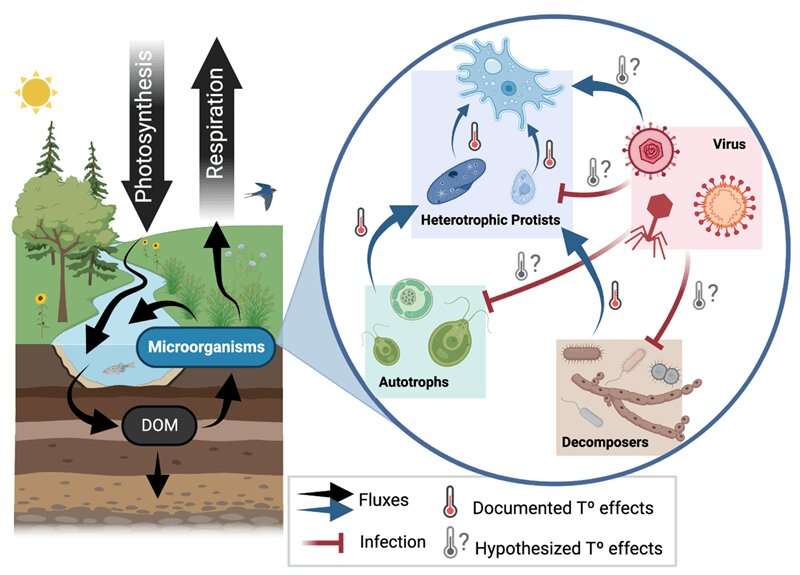Viruses could reshuffle the carbon cycle in a warming world

Microbes play important roles in ecosystems, and these roles are changing with global warming. Scientists also now know that most types of microbes are infected by viruses, but they know relatively little about how these viral infections could change how microbes react to warming.
In a study published in FEMS Microbiology Ecology, scientists describe many different ways that increasing temperatures could affect viruses and their microbial hosts. These changes could ultimately affect the responses of whole ecosystems to warming. The work exposes several important gaps in researchers’ current knowledge about the connections between viruses, warming, and ecosystem functioning. Filling these gaps is crucial for understanding and predicting the effects of climate change on ecosystems.
This study creates a roadmap for understanding the many different ways that viruses could modify the effects of warming on communities of microbes. Viruses likely have strong effects on processes with microbes and the ways ecosystems function. Incorporating these previously ignored effects into ecosystem models will help scientists improve their predictions of how ecosystems could respond to climate change.
Microorganisms play integral roles in ecosystems by controlling the flow of energy and matter through processes like photosynthesis (carbon uptake), respiration (carbon release), and decomposition (carbon recycling). Climate change is currently altering how ecosystems function by changing how organisms operate within microbial food webs. Scientists know that viruses can have strong impacts on microbial processes, but they have less knowledge of how these impacts will change with future warming.
In this study, scientists from Duke University, the University of Tennessee Knoxville, the Netherlands Institute of Ecology, and Oak Ridge National Laboratory reviewed the potential impacts of warming on viruses and how these might alter scientific understanding of ecosystem responses to climate change. Warming likely affects several different stages of the viral infection cycle, as well as virus-host dynamics. However, there are still many gaps in our understanding about these effects.
Because viruses are ubiquitous across all habitats and have strong effects on microbial functioning, filling these gaps is critical to understanding how warming will affect the flow of energy and matter within ecosystems. The researchers’ preliminary models show that viruses could potentially tip the scales on natural carbon balances, causing some ecosystems to switch from being net carbon sources (releasing more carbon than they store) to being net carbon sinks (absorbing carbon). This study shows how incorporating viruses into predictive models can lead to new and unexpected effects on ecosystems in response to climate change.
More information:
Daniel J Wieczynski et al, Viral infections likely mediate microbial controls on ecosystem responses to global warming, FEMS Microbiology Ecology (2023). DOI: 10.1093/femsec/fiad016
Citation:
Viruses could reshuffle the carbon cycle in a warming world (2023, May 8)
retrieved 8 May 2023
from https://phys.org/news/2023-05-viruses-reshuffle-carbon-world.html
This document is subject to copyright. Apart from any fair dealing for the purpose of private study or research, no
part may be reproduced without the written permission. The content is provided for information purposes only.
For all the latest Science News Click Here
For the latest news and updates, follow us on Google News.

